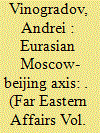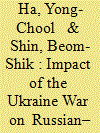|
|
|
Sort Order |
|
|
|
Items / Page
|
|
|
|
|
|
|
| Srl | Item |
| 1 |
ID:
151260


|
|
|
|
|
| Summary/Abstract |
A round table marking the 15th anniversary of the signing of the Treaty on Good-Neighborliness, Friendship, and Cooperation between the Russian Federation and the People's Republic of China was held at the Russian Academy of Sciences' Institute for Far Eastern Studies (RASIFES) on May 27, 2016. The topic was the current state of Russian-Chinese relations. The event was organized by the Institute's Center for the Study and Forecasting of Russia-China Relations. Taking part in discussions on the current state of and outlook for relations between the two countries were research workers and officials from the RAS IFES, the RAS Institute of Oriental Studies (RAS IOS), and other expert analytical institutions. A list of presentations made by round table participants is presented below.
|
|
|
|
|
|
|
|
|
|
|
|
|
|
|
|
| 2 |
ID:
189293


|
|
|
|
|
| Summary/Abstract |
Russian-Chinese relations in the 20 years since the signing of the Grand Treaty of June 2001 have become a key factor of global development. Despite vigorous opposition from the West, their importance in world politics has steadily risen. They have encountered major challenges at all levels of cooperation (bilateral, regional, and global), but both countries have invariably responded to them effectively. Russia's role has grown steadily in proportion to the escalation of the China-US rivalry. Russia and China have shown that they complement each other not only on the level of bilateral economic relations, but also on a global scale, allowing them to address shared problems of creating a new international order and resisting pressure from the West. Extension of the Treaty has both confirmed the strategic nature of their relations and opened new areas of collaboration - ideological and otherwise. Amid growing tensions and the creation of new blocs in the Indo-Pacific region aimed at containing China, Russian-Chinese partnership is growing stronger without becoming a formal alliance. This type of harmonious and coordinated collaboration between major powers can be described as an axis.
|
|
|
|
|
|
|
|
|
|
|
|
|
|
|
|
| 3 |
ID:
181417


|
|
|
|
|
| Summary/Abstract |
The high level of hostility between the Soviet Union and China that had characterized the previous two decades still existed when Mikhail Gorbachev became General Secretary of the Central Committee of the Soviet Union's Communist Party in March 1985. To normalize Soviet-Chinese relations as quickly as possible, Gorbachev made certain concessions, gradually meeting all demands made by China at political consultations. The May 1989 Soviet-Chinese summit held in Beijing thus formally marked the normalization of Soviet-Chinese relations. In a joint Soviet-Chinese communiqué issued after the summit, it was noted that the development of Soviet-Chinese relations after normalization would be based on "five principles of peaceful coexistence," and not be directed against third countries. During his visit to China, Gorbachev and the Chinese leadership reached an agreement on quickly resolving territorial disputes and creating a mechanism for high-level political dialogue. The end to the hostility between the Soviet Union and the People's Republic of China and the resolution of territorial issues laid the foundation for the subsequent smooth transition from Soviet-Chinese to Russian-
|
|
|
|
|
|
|
|
|
|
|
|
|
|
|
|
| 4 |
ID:
189181


|
|
|
|
|
| Summary/Abstract |
IT SOMETIMES happens that history itself evaluates what a specific individual has done. A case in point is Igor Rogachev, a renowned Soviet and Russian diplomat who played a tremendous role in bolstering our country's positions in the Asia-Pacific region (APAC) and in reforming the former Soviet Union's, and subsequently Russia's, relations with China, where he served as the ambassador of the Russian Federation for 13 years.
|
|
|
|
|
|
|
|
|
|
|
|
|
|
|
|
| 5 |
ID:
173274


|
|
|
|
|
| Summary/Abstract |
NORMALLY, the historical-cultural aspect of social-political processes is not treated as an item of top priority of the scholarly agenda. More likely than not, researchers tend to look for the sources of what is going on in economic conditions or political ambitions of individuals or communities and let out of sight one important component, i.e., the cultural foundation of societal systems which is rooted in a distant past.
|
|
|
|
|
|
|
|
|
|
|
|
|
|
|
|
| 6 |
ID:
175946


|
|
|
|
|
| Summary/Abstract |
This article deals with the current state of the process of humanitarian interaction between Russia and China. The humanitarian ties of the two countries, enriched with new content, are multifaceted and complex. The important component of comprehensive strategic partnership between Russia and China is cooperation between regions of the two countries. The author draws the conclusion that humanitarian ties between RF and PRC at all levels and in various areas give a powerful impetus to the further development of relations between the two countries adapting to the needs of the new era and strengthening mutual understanding between their peoples.
|
|
|
|
|
|
|
|
|
|
|
|
|
|
|
|
| 7 |
ID:
187982


|
|
|
|
|
| Summary/Abstract |
This article examines the impact of the Ukraine war on Russian–North Korean relations at three different levels. At the international level, the war will bring two power groups into confrontation. The closer security cooperation between Russia and China will form an illiberal group that will set the security environment for North Korea to establish a new international identity. At the regional level, Russian–Chinese security alignment will be reinforced, which North Korea will exploit. At the bilateral level, Russian–North Korean relations will be strengthened as Russia’s influence in Northeast Asia wanes.
|
|
|
|
|
|
|
|
|
|
|
|
|
|
|
|
| 8 |
ID:
185056


|
|
|
|
|
| Summary/Abstract |
The year 2009 saw the publication in Russian of the memoirs of former Soviet Foreign Minister and Georgian President Eduard Shevardnadze, which contained an "astonishing" episode of a long argument he had with Deng Xiaoping over border and territorial issues during a February 1989 visit to China. Shevardnadze claimed that Deng expressed the view that vast expanses of the Soviet Union - three to four million square kilometers - belonged to China. These words of Deng in Shevardnadze's memoirs have been cited as an argument in works by many historians of different countries. However, this recollection is not backed by any additional proof. Moreover, many details of this account contradict known historical facts or are entirely illogical. There are grounds for believing that this episode in Shevardnadze's memoirs is an erroneous or even false memory. Neither can the possibility be excluded that it was adeliberate fabrication. This episode can therefore not be considered a reliable source for citation. At the Soviet-Chinese summit, Deng did indeed say that in the past, Russia and the Soviet Union took millions of square kilometers of land from China. At the same time, however, he promised the Soviet leader that China would not make any territorial claims. From the mid-1980s on, Deng Xiaoping actively supported the most rapid settlement possible of Soviet-Chinese border issues through negotiations. This meant that 99% of the border between Russia and China was delimited on a legal basis in the final years of Deng's life. Russian-Chinese border issues have now been settled once and for all. Academic studies and debates on issues associated with territories and borders in the history of Soviet-Chinese relations can of course continue. However, research and discussion must be based on reliable sources and be purely academic in nature.
|
|
|
|
|
|
|
|
|
|
|
|
|
|
|
|
| 9 |
ID:
147768


|
|
|
|
|
| Summary/Abstract |
IT HAS BEEN GENERALLY ACCEPTED that in 1976 a decade-long turmoil, called the "Cultural Revolution," ended in China. Early September 1976 marked the death of Mao Zedong, an inspirer and the main stage director of this mass "performance," which deeply traumatized the entire Chinese society. In a month's time from his death, the "Gang of Four," which comprised the most strenuous supporters of the ultra-leftist ideology and practices, was arrested. The country started recovering and considering paths to follow in the future and ways of favorably positioning itself on the world arena.
|
|
|
|
|
|
|
|
|
|
|
|
|
|
|
|
| 10 |
ID:
157257


|
|
|
|
|
| Summary/Abstract |
RUSSIA'S POSITION on territorial and border conflicts in East Asia arouses great interest. Most of these conflicts have deep roots in and are consequences of the Cold War, primarily stemming from legal gaps in the system of interstate borders that is based on the San Francisco Peace Treaty.
|
|
|
|
|
|
|
|
|
|
|
|
|
|
|
|
|
|
|
|
|